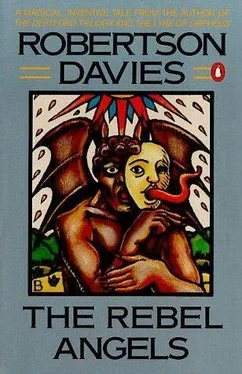Robertson Davies - The Rebel Angels
Здесь есть возможность читать онлайн «Robertson Davies - The Rebel Angels» весь текст электронной книги совершенно бесплатно (целиком полную версию без сокращений). В некоторых случаях можно слушать аудио, скачать через торрент в формате fb2 и присутствует краткое содержание. Жанр: Триллер, на английском языке. Описание произведения, (предисловие) а так же отзывы посетителей доступны на портале библиотеки ЛибКат.
- Название:The Rebel Angels
- Автор:
- Жанр:
- Год:неизвестен
- ISBN:нет данных
- Рейтинг книги:5 / 5. Голосов: 1
-
Избранное:Добавить в избранное
- Отзывы:
-
Ваша оценка:
- 100
- 1
- 2
- 3
- 4
- 5
The Rebel Angels: краткое содержание, описание и аннотация
Предлагаем к чтению аннотацию, описание, краткое содержание или предисловие (зависит от того, что написал сам автор книги «The Rebel Angels»). Если вы не нашли необходимую информацию о книге — напишите в комментариях, мы постараемся отыскать её.
The Rebel Angels — читать онлайн бесплатно полную книгу (весь текст) целиком
Ниже представлен текст книги, разбитый по страницам. Система сохранения места последней прочитанной страницы, позволяет с удобством читать онлайн бесплатно книгу «The Rebel Angels», без необходимости каждый раз заново искать на чём Вы остановились. Поставьте закладку, и сможете в любой момент перейти на страницу, на которой закончили чтение.
Интервал:
Закладка:
"He certainly seems to be a failure as a novelist – though I don't set up to know."
"You can't make a novelist out of a philosopher. Ever read any of Bertrand Russell's fiction?"
There was never any question of Hollier's reading the book himself. He was too much taken up with his rage against McVarish. It was in February he made me take him to visit Mamusia, and during that miserable hour I kept in the background, terrified by what she was able to corkscrew out of him. It had never entered my mind that he would ask her for a curse. I suppose it is a measure of how stupid I am that I was able to read and write of such things in his company and under his direction, as part of the tissue of past life we were studying, but it never occurred to me that he might seize upon a portion of that bygone life – at least it seemed to me that it belonged to the past – as a way of revenging himself on his adversary. I had never admired Mamusia so much; her severity of calm, good sense made me proud of her. But Hollier was transformed. Whose was the Wild Mind now?
From that day onward he never mentioned the matter to me.
Not so Mamusia. "You were angry about my little plan at Christmas," she said, "but you see how well everything is turning out. Poor Hollier is a madman. He will be in deep trouble. No husband for you, my girl. It was the hand of Fate that directed the cup of coffee to the priest Darcourt. Have you heard anything from him yet?"
3
Had I heard anything from the priest Darcourt? It was easy for Mamusia to talk about Fate as if she were Fate's accomplice and instrument; beyond a doubt she believed in the power of her nasty philtre, made of ground appleseed and my menstrual blood, because its action was as much taken for granted by her as were the principles of scientific method by Ozy Froats. But for me to admit that there could be any direct relationship between what she had done and the attitude towards me that I now detected in Simon Darcourt would mean a rejection of the modern world and either the acceptance of coincidence as a factor in daily life – a notion for which I harboured a thoroughly modern scorn – or else an admission that some things happened that ran on separate but parallel tracks, and occasionally flashed by one another with blazes of confusing light, like trains passing one another in the night. There was a stylish word for this: synchronicity. But I did not want to think about that: I was a pupil of Hollier's and I wanted to examine the things that belonged to Mamusia's world as matter to be studied, but not beliefs to be accepted and lived. So I tried not to pay too much attention to Simon Darcourt, so far as being his pupil and the necessities of common civility allowed.
This would have been easier if I had not been troubled by disloyal thoughts about Hollier. I still loved him, or cherished feeling for him which I called love because there seemed to be no other appropriate name. Now and then, in the talks I had with him about my work, he said something that was so illuminating that I was confirmed in my conviction that he was a great teacher, an inspirer, an opener of new paths. But his obsession with the Gryphius MSS and the things he said about them and about Urquhart McVarish seemed to come from another man; an obsessed, silly, vain man. I had put out of my head all hope that he would spare any loving thoughts for me, and though I pretended I was ready to play the role of Patient Griselda and put up with anything for the greater glory of Hollier, another girl inside me was coming to the conclusion that my love for him was a great mistake, that nothing would come of it, and that I had better get over it and move on to something else, and of this practical femininity I was foolishly ashamed. But could I love Cain Raised?
All you want is a lover, said the scholar in me, with scorn. And what's wrong with that, said the woman in me, with a Gypsy jut of the hip. If you are looking for a lover, said a third element (which I could not identify, but which I suppose must be called common awareness), Simon Darcourt has lover written all over him.
Yes, but -. But what? You seem to be yearning after one of these Rebel Angels, who people the universities and have established what Paracelsus calls The Second Paradise of Learning, and who are ready and willing to teach all manner of wisdom to the daughters of men. Yes, but Simon Darcourt is forty-five, and stoutish, and a priest in the Anglican church. He is learned, kind, and he obviously loves you. I know; that satisfies the scholar, but the Gypsy girl just laughs and says it won't do at all. What sort of a figure would I cut as a parson's wife? A scholar – and you have hopes of a reputation in that work – would be just the wife for a scholar-parson. And again the Gypsy girl laughs. I tell the Gypsy girl to go to hell; I am not prepared to admit (not yet, anyway) that a Gypsy trick with a love philtre has plumped poor Simon and me into this pickle, but certainly I am not going to put up with Gypsy mockery in my present position. What a mess!
This inner confusion plagued me night and day. I felt that it was destroying my health, but every morning, when I looked in the mirror expecting to see the ravages of a tortured spirit etched into my face in crow's-feet and harsh lines, I was forced to admit that I was looking as well as I ever had in my life, and I will not pretend that I wasn't glad of it. Scholar I may be, but I refuse to play the game some of the scholarly women in the University play, and make the worst of myself, dress as if I stole clothes out of the St. Vincent de Paul box, and have my hair cut in a dark cellar by a madman with a knife and fork. The Gypsy strain, I suppose. On with the ear-rings and the gaudy scarves; glory in your long black hair, and walk proudly, holding your head high. That is at least a part of what God made you for.
This, I concluded, was what life involved at my age; confusion, but at least an intensely interesting confusion. Since I was old enough to conceive of such a thing, I have longed for enlightenment. In private prayer, at school, I lifted my eyes to the altar and begged O God, don't let me die stupid. What I was going through now must be part of the price that had to be paid if that prayer were to be answered. Feed on this in thy heart and be thankful, Maria.
An unexpected sort of enlightenment broke upon me in mid-March, when Simon manoeuvred me into his rooms at Ploughwright (he thought he was being clever, but there was clearly a good deal of planning to it) and gave me coffee and cognac and told me he loved me. He did it wonderfully well. What he said didn't sound in the least contrived, or rehearsed; it was simple and eloquent and free from any extravagances about eternal devotion, or not knowing what he would do if I could not return his love, or any of that tedious stuff. But what really shook me out of my self-possession was his confession that in his life I had taken on the character of Sophia.
I suppose that most men, when they fall in love, hang some sort of label on the woman they want, and attribute to her all sorts of characteristics that are not really hers. Or should I say, not completely hers, because it is hard to see things in somebody else that have no shred of reality, if you are not a complete fool. Women do it, too. Had I not convinced myself that Hollier was, in the very best sense, a Wizard? And could anyone deny that Hollier was in a considerable measure (though probably less than I imagined) a Wizard? I suppose the disillusion that comes after marriage, about which so much is said now, is the recognition that the label was not precise, or else the lover had neglected to read the small print on the label. But surely only the very young, or the people who never know much about themselves, hang labels on those they love that have no correspondence whatever with reality? The disillusion of stupid people is surely just as foolish as their initial illusion? I don't pretend to know; only the wiseacres who write books about love, and marriage, and sex, seem to possess complete certainty. But I do think that without some measure of illusion life becomes intolerable.
Читать дальшеИнтервал:
Закладка:
Похожие книги на «The Rebel Angels»
Представляем Вашему вниманию похожие книги на «The Rebel Angels» списком для выбора. Мы отобрали схожую по названию и смыслу литературу в надежде предоставить читателям больше вариантов отыскать новые, интересные, ещё непрочитанные произведения.
Обсуждение, отзывы о книге «The Rebel Angels» и просто собственные мнения читателей. Оставьте ваши комментарии, напишите, что Вы думаете о произведении, его смысле или главных героях. Укажите что конкретно понравилось, а что нет, и почему Вы так считаете.












